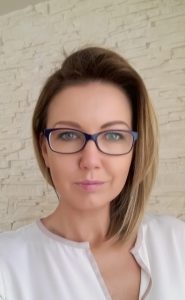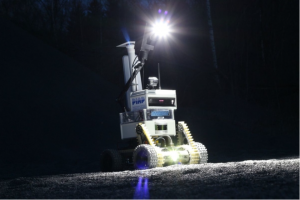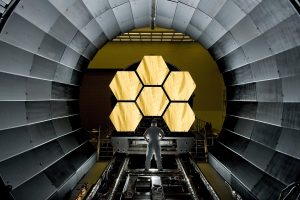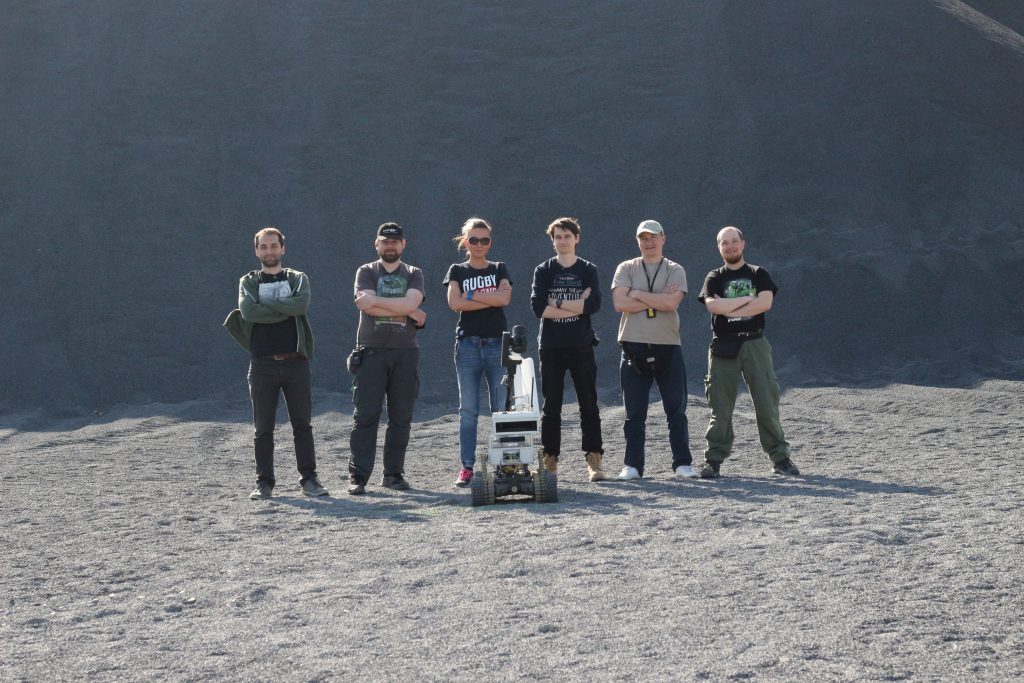
Marlena Gołofit, member of Polish Space Professionals Association, enthusiast of talent development in organizations and space exploration, HR advisor, recruiter, Design Thinking consultant and lecturer meets the Future Space team to answer some questions about her work, passion and the space sector.
- You are a Human Resources expert, but your interests are associated with space. How does your hobby connect with your work? Where did your interests regarding space came from? If this is not related to your education, how did it click with you, to the point that your career is now bound with the subject?
My professional adventure in the space sector started few years ago, when I had the opportunity to coordinate a project carried out for the European Space Agency. The main objective of the project was to determine the realistically achievable maximum speed of the teleoperated rover for lunar exploration through a number of controlled tests carried out in a lunar analogue environment (the photo shows one part of the RaCER Project team during testing – shared thanks to the courtesy of the PIAP SPACE). It was an unforgettable and important milestone on my career path to work with specialists from the PIAP Space and the PIAP who shared my passion for the space exploration.
My passion for HR and Design Thinking was born 8 years ago. When I was coordinating an R&D project I experienced the importance of team building, proper skills management and identifying strengths in the team.
Working on projects, building development paths, implementing Design Thinking, discovering and acquiring talents for organizations, as well as sharing knowledge on space exploration are my life and professional flow.
And what is flow?
That concept was established by Mihály Csíkszentmihályi. According to that Hungarian psychologist, flow is a state of mind in which people are so focused during a given task that everything else seems to disappear (time, space, external motivation ceases to matter). All the attention and the entire consciousness become one hundred percent focused on the undergoing activity. “The best moments in our lives are not the passive, receptive, relaxing times . . . The best moments usually occur if a person’s body or mind is stretched to its limits in a voluntary effort to accomplish something difficult and worthwhile” – Mihály Csíkszentmihályi.
When I help people to find or change their career path, we always begin by answering the following questions: What is your Flow? How to Achieve Flow?

- Which skills are important to develop from a young age, with the perspective of going to a job interview? Which are the most attractive to the employer?
Our decisions on initiatives and projects in which we engage in the course of primary, secondary or higher education are important to consciously identify our strengths and often passions, which can later begin our career path. “Choose a job you love, and you will never have to work a day in your life.” – Confucius
Cooperation within a school or student research club or an association, where we can broad the knowledge in a given area, is as important as the opportunity to experience teamwork, discover our talents and stimulate our creativity and openness to new ideas.
During studies, especially if we think about building our career path in the space sector, it is worth to read sector publications and join open lectures/meetings, where we can talk with people who already work in that sector. ,,If you want to go somewhere, it is best to find someone who has already been there.” – Robert Kiyosaki. We have such an opportunity by participating, among others, in events organized by the Space Hub or the Warsaw space technology hub, Cosmic Hub. It is also possible to undertake an internship in companies operating in the space industry, for example the internship program “Development of human resources in the space sector”, organized by the Industrial Development Agency SA and the Union of the Space Sector Employers. That program is held under the patronage of the Polish Space Agency.
What are the top skills employers are looking for?
According the World Economic Forum’s Future of Jobs Report 50% of all employees will need reskilling by 2025, as adoption of technology increases, critical thinking and problem-solving top the list of skills employers believe will grow in prominence in the next five years.
Source: https://www.weforum.org/reports/the-future-of-jobs-report-2020/in-full/infographics-e4e69e4de7
The Report – Link: http://www3.weforum.org/docs/WEF_Future_of_Jobs_2020.pdf

- How should a person prepare for a job interview, what should we pay attention to?
When we start our adventure with the labor market and potential employers, and prepare for the first job interview, we should collect all the information on our experience gained both in school and during studies, among others: What projects have we managed to implement? What were the results of these projects? What was our role in these projects or initiatives? What strengths have we discovered? Development in what area is important to us and why?
Before a job interview we should get acquainted with the profile and projects of our potential employer. We should be prepared to explain why have we decided to apply to this particular organization. It is also worth to prepare questions that we would like to ask employees of a the company. A recruitment meeting is important for both parties. It is a safe space to ask questions both for representatives of a potential employer and for a job candidate. It gives us an opportunity to better understand the organizational culture and further perspectives for our career path. The recruitment process should give both parties sufficient information to decide whether they want to work with each other – similar to negotiations where parties seek to achieve o win-win status
- Is there a place in space sector for people who are not into STEM (Science, Technology, Engineering and Math)?
There is a very interesting question that I am often asked. The cosmic sector needs STEM competences and knowledge, but there is also a place for a whole spectrum of other professions. The space sector needs lawyers, doctors, economists, architects, designers… it is only up to us which path we choose. According to Chiaki Mukai (Doctor and Astronaut), the co-author of the Messages from Space Explorers, “If you can dream it, you can do it”.
“What is my dream job?” “What is my dream career?” The often we ask ourselves these questions at an early stage of our education, the more we know what initiatives to engage in, what to read, what groups to join using social media, what events to participate in, what on-line trainings/ webinars (available also free of charge) to join.
The additional inspiration: Messages from Space Explorers to Future Generations
LINK: https://www.unoosa.org/documents/pdf/outreach/astromessages/mseE.pdf

- Going back to the space sector, how would you rate one of the newer projects that POLSA engaged itself in, the Future Space project? From of all of the mentioned technologies of the space sector which one do you consider to be the most interesting? Which has the biggest potential from our perspective?
Projects such as Future Space play an important role in inspiring young people and discovering opportunities for building a career path in the space industry. Thanks to the project, young people can learn about current projects carried out, among others, for the European Space Agency, by organizations operating in Poland. Currently, there is a dynamic development of the space sector in Poland, and companies operate in many different areas, including automation, robotics, electronics, mechanics, constructions, communication and navigation (GNSS), the use of satellite data, databases, optics and optoelectronics, power systems and drives, materials engineering, as well as space software (ground and on-board). This shows the potential of the space sector and the opportunity to make passion our professional work.
The Polish Space Agency has published a catalog containing information on the most important domestic space sector entities, whose activities focus on satellite and space technologies. It is worth reading in order to assess the industry potential.
LINK: https://polsa.gov.pl/images/polski_sektor_kosmiczny_katalog_pl_eng/POGLAD_PAK-KATALOG_PL_small.pdf
And if for some people space technologies are still science fiction, then it is worth reading the Spinoff reports, published annually by NASA, on technologies / products / solutions that were mainly intended for the space sector, but were eventually commercialized for our daily use here on Earth. Since 1976, NASA has developed over 2,000 spin-offs – “Here’s more SPACE in your life than you think!”
LINK: https://spinoff.nasa.gov/
“Space programs, the work of hundreds of thousands of men and woman, bring enormous satisfaction: a person realizes that he or she helps the history to pave the way for a wonderful future” – Jeannette Piccard, First Woman in the stratosphere.

This interview was conducted by Bartosz Bronikowski, Marcin Mołda and Bartosz Naus, the journalism students at the University of Gdansk.
Polish Space Agency wishes to thank Marlena Gołofit for her remarkable help in editing of the final version of this text, especially for providing the additional and inspiring referrences and links.
Photo credit:
1, 3, 6 – PIAP Space
2 – Marlena’a Gołofit private archive
4, 5 – pixabay.com
